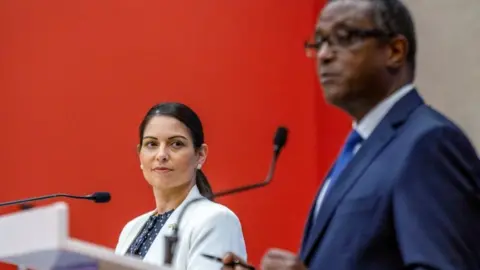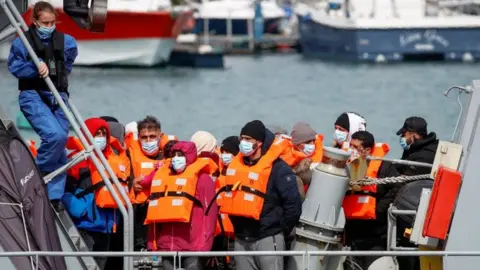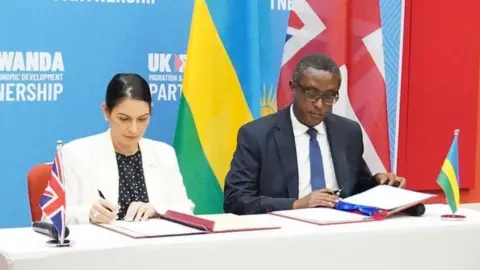Rwanda asylum seekers: What does the UK's deal mean?

 Reuters
ReutersThere was only muted applause from a handful of officials as the politicians shook hands in the Kigali Conference Centre, smiling awkwardly for the cameras.
But Home Secretary Priti Patel hailed the Rwandan deal as a world first, a major milestone. And it is. Potentially.
Some nations have attempted to outsource their asylum processing offshore. But no country has ever tried to export its asylum responsibilities before.
What the deal envisages is an end to the system of protection for those fleeing war and persecution that Britain signed up to more than 70 years ago.
 Reuters
ReutersInstead of claiming asylum when they arrive in Britain, those fleeing persecution or war will have to find a legal and safe route to the UK or, for most, face being packed off to Africa. There are currently very few such routes and none available to the citizens of countries that make up the bulk of those granted refugee status in Britain.
What is an asylum seeker form Iraq or Iran, say, supposed to do? They are faced with Catch 22. They can only claim asylum to Britain on British soil. But in reaching the UK, they make themselves inadmissible for asylum.
For the home secretary and the prime minister, that appears to be the long-term aim: to stop all asylum seekers from coming to Britain. Instead, we are promised a network of safe routes from UN-run refugee camps.
As things stand, the UK is a passive recipient of those asking for sanctuary. The government has no control over who the asylum seekers are. The new plan would mean politicians could pick and choose.
"It's a striking fact that around seven out of 10 of those arriving in small boats last year were men under 40, paying people smugglers to queue jump and taking up our capacity to help genuine women and child refugees," was how the prime minister put it.
Boris Johnson knew what buttons he was pressing when he said: "We can't ask the British taxpayer to write a blank cheque to cover the costs of anyone who might want to come and live here."
There is concern the UK is being taken for a ride by people simply seeking a better life.
He conflated the thousands of people risking their lives to reach the Kent coast in small boats with "economic migrants taking advantage of the asylum system".
The problem with this argument is that a substantial majority of those who cross the channel are subsequently granted refugee status by the UK government. Home Office officials decide they do indeed have a well-founded fear of persecution in their country of origin.
It was noticeable how upbeat the home secretary was as she jetted to Kigali to sign on the dotted line.
 PA Media
PA MediaPriti Patel has faced a great deal of criticism in recent weeks, often from MPs on her own side. But she sees the Rwandan deal, nine months in the making, as an opportunity to defeat the "evil people smugglers" whose activities in the Channel are so humiliating for a government that promised to take back control of Britain's borders.
I sense this home secretary relishes the opportunity of a battle against "the naysayers", her "political opponents" who "condemn everything" without a plan of their own, and the asylum "lawyers who are fleecing the British taxpayer".
That is an argument that would play well with her core support, burnish her Brexit credentials, and helpfully change the conversation from visa delays and "partygate".
One can see, then, why the UK government would want this deal, but what about the Rwandans? Are they happy about it?
We don't know all the details of the arrangement, but there is an initial £120m for educational projects and other money to assist with processing sent by the UK.
Rwandan ministers believe the arrival of motivated migrants will help boost their economy and the deal itself will encourage further investment.
But one wonders what the ordinary Rwandan will think of a rich European country sending its problem to a small African state.
